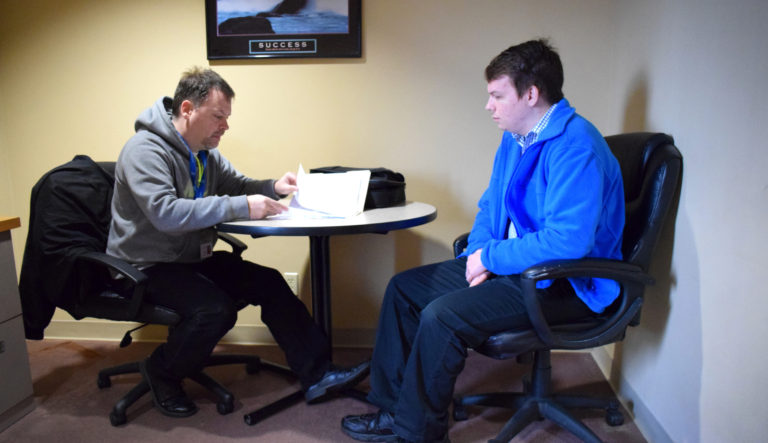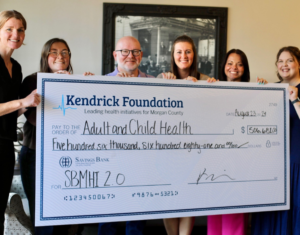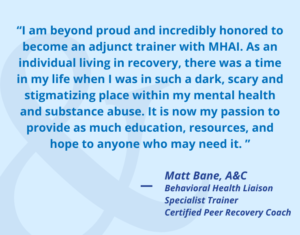Anyone who has conducted a job search knows it’s not easy. The fill-out-an-application, go-to-an-interview, get-hired progression makes it seem simple, but it it’s not.
For the marginalized populations Adult & Child Health serves, a job could mean the first foothold onto a more stable life. Layers of mental illness, disability, or injury, however, are hurdles that are difficult to clear alone. A&C’s Job Links program serves as a link into the employment world. Its mission is to find jobs for those who need both a partner and an advocate.
How does Job Links help your job search?
The Job Links team includes a team leader and a seven-person employment staff. Five employment specialists work in the community along with a full-time career coach, and three of the five employment specialists also work as career coaches.
Employment Specialists manage a caseload of clients. They work with each person to determine and execute the best method to achieve lasting employment through a job search. Though new, the school coaches are an important addition to the team.
After a yearlong process to establish the program, specialists are currently making waves with high school-aged clients. School coaches work with students who have Individualized Education Plans, 504 Plans and disabilities. This helps them prepare for college & careers.
“I get tons of great feedback about the work they’re doing in schools,” Team Leader Carla Orr said. The school coaches have also begun working with School Based teams, encouraging collaboration and generating referrals.
All team members work with clients 1-on-1, building a relationship along with a resume. This often begins with a get-to-know-you phase where a coach digs into a client’s personality, interests, and struggles. They ultimately want to help their clients get their dream jobs. First, however, they focus on each milestone and manage setbacks as they come. It’s the most sustainable method of working through the program.
Click here to learn more about how to participate in the Job Links program.
How Job Links helped John Witcher
“I spend the majority of my time out in the community,” said John Witcher, an employment specialist who has worked at Adult & Child for more than a year. “I had a client do a work experience session at Goodwill where I go in and observe them on the job for a couple hours. (We want) to see, before we place them, do they have enough stamina? Does it look like they have any knee or back pain? Can they get along with others? I do a lot of work to build relationships with local businesses. You don’t want to set somebody up to fail.”
This work isn’t just a job to Witcher. It’s a calling that’s rooted in personal understanding of how much the team’s job search expertise can offer people.
His A&C journey first started decades ago, as a Job Links client. “I work very very hard at what I do because that used to be me on the other side of the table,” Witcher said. “I take it personally, I’m in it to change lives.”
RELATED CONTENT: Learn more about Adult & Child Health’s Open Access program for patients who are suffering from mental illness
Through working with Job Links as a client, he found and sustained a steady job for 16 years. He then went on to earn an MBA and eventually returned to Adult & Child, this time as a Job Links Employment Specialist to give back to the program that meant so much to him.
“When I first came in contact with Adult and Child in 1994, I was just a scared person with a mental illness,” Witcher said. “A lot of very great people have helped me out along the way and I plan to do the same.”
‘I believe everybody can do something’
Orr describes the client-coach relationship in a job search as a type of partnership. That approach seems to help clients retain the jobs they get more often by helping foster a sense of accomplishment.
“I want to work as hard as you do to find a job,” she said. “There may be things that you can’t do or aren’t able to do for certain reasons, but I believe everybody can do something.”
Orr and Witcher agree that one of the most difficult parts of the job search is battling the stigma around mental illness & invisible disabilities. Disability inclusion has improved in recent years, it could still be better. Breaking down those barriers with employers is imperative to creating opportunities for clients.
Orr said her teammates have a social worker’s heart, but also, “they have a marketing and PR ability that necessitates a lot of the work they do. If you can’t go out and talk to employers or if you’re too shy to present in front of a business, you’re not going to be able to develop a specific niche job for someone or an opportunity to shadow,” she said.
Team members take pride in educating employers, championing their clients, and working creatively to generate unforeseen opportunities.
Job Links’ funding challenges
Historically, Job Links maintained a strong relationship with the state’s Vocational Rehabilitation Program, which provided most of Job Links’ clients and funding. VR funds job-specific services to people who qualify based on disability, injury, and/or mental illness. But recent changes in the VR program have drastically tightened its eligibility and shifted the pay structure, hitting Job Links hard.
“When I first started, I had about 90 percent VR clients,” Witcher said in April. “Now it’s about 50 (percent).”
Currently, Witcher said VR clients account for only about 20 percent of the caseload. They work primarily with A&C clients who are also participating in VR services.
This change shocked the program financially and in a practical sense. VR gives Job Links the opportunity to bill for its exact purpose: career coaching and all career-related items. Working with other funding sources tempers Job Links’ ability to bill directly for career-related coaching.
How Job Links is working around those challenges
The team is using its creativity-driven hustling skills to help the department adapt.
RELATED CONTENT: Learn more about Adult & Child Health’s Youth Development program
“We’ve tried to turn it around into something positive,” Orr said. “The good thing that has come from this is that we’re excited to reach out and work even more collaboratively, even more than we used to with the individuals that are served here [at Adult & Child.]”
Medicaid billing structure and other types of insurance can pay for job search services related to career coaching, such as skills development in areas like interpersonal communication, conflict resolution and self-sufficiency. It doesn’t pay for directly career-related tasks like filling out applications, resume development or work experience supervision.
Though these realities seem uncomfortable, the team is optimistic, treating the big changes like big challenges. While Job Links has always taken A&C-referred clients, it’s becoming more of a primary focus as VR pulls away and the team adjusts to a new rhythm.
Getting a chance to hear multiple perspectives on the challenges and barriers the clients face has been difficult to receive with VR cases. The team is ready to “come to the table” and participate in multi-layered supports for A&C clients.
“With the seven folks here, we’re ready to partner,” Orr said “Now can we serve everybody at the agency who wants to find a job? I hope so. One day,” said Carla. “I’m not so naïve to think that seven people can do it all, but seven people can start to make a difference for some folks.”
Cynthia successfully worked through our Job Links program.
This is an updated version of an article that originally published April 11, 2018.






